4 Latin America and the Caribbean
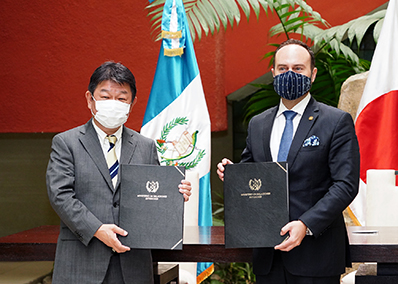
Then Foreign Minister Motegi exchanging notes with Foreign Minister Brolo on grant aid for reconstruction after a hurricane disaster in Guatemala (July 2021)
Latin America and the Caribbean is an enormous market and a region of strategic importance in terms of trade. With democracy taking root in the region, it is also a supplier of mineral, energy, and food resources, and has been steadily increasing its presence in the international community. On the other hand, it is also characterized by wide disparities in wealth with a large number of people still suffering from poverty. Furthermore, this region has a traditionally strong personal and historical bond with Japan due to the Nikkei community (community of Japanese immigrants and their descendants), numbering more than two million. Japan has thus maintained stable and friendly relations with this region for a long period.
● Japan’s Efforts
Through two rounds of trips in 2021 (January and July), then Foreign Minister Motegi visited a total of eight Latin American and the Caribbean countries, the largest number among all previous foreign ministers, and announced that Japan would continue cooperation in areas such as COVID-19 countermeasures and disaster risk reduction. In addition, at the Foreign Ministers’ meetings with the Central American Integration System (SICA) and the Caribbean Community (CARICOM), he stated that, besides the aforementioned areas, Japan would promote cooperation in the field of environment and climate change, and particularly with SICA in supporting migrants in Central American countries. Following the inauguration of Prime Minister Kishida as well, Japan has worked to further strengthen its relationship with the Latin America and the Caribbean region. In November, the Vice President and Foreign Minister of Colombia and the Foreign Minister of Paraguay visited Japan and made a courtesy call on Prime Minister Kishida and held a foreign ministers’ meeting, respectively. Also the Japan-Brazil Foreign Ministers’ telephone talk and Japan-Argentina Foreign Ministers’ video conference were held in December.
■ Efforts toward Disaster Risk Reduction and Environmental Issues
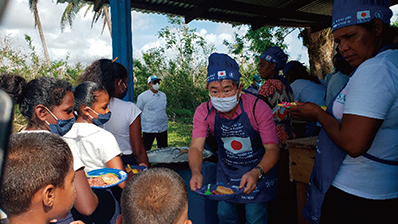
Distributing school meals through Japan’s support in hurricane-affected areas in Nicaragua (Photo: WFP)
While the Latin American and the Caribbean region is blessed with abundant nature, the region is prone to natural disasters such as earthquakes, tsunamis, hurricanes, and volcanic eruptions. Therefore, it is of great importance that Japan supports this region with its knowledge and experience in the field of disaster risk reduction.
Japan has provided emergency relief goods and $3.25 million in Emergency Grant Aid to deliver humanitarian assistance including food, water and sanitation measures to Haiti, which was devastated by the 7.2 magnitude earthquake in 2021. In 2021, Japan also provided equipment for reconstruction to Guatemala, Honduras, and Nicaragua, which suffered damage from hurricanes. In addition, for Saint Vincent, which was affected by a volcanic eruption, Japan provided emergency relief goods as well as $1.58 million in Emergency Grant Aid for shelter renovation and food. Furthermore, Japan has provided assistance that utilizes Japan’s expertise in the disaster risk reduction field to the Caribbean countries and the countries bordering the Pacific Ocean including Chile, Ecuador, Mexico, and Peru, where earthquakes frequently strike.
The Project on Capacity Development for Disaster Risk Management in Central America named “BOSAI,” which aims to share knowledge on disaster risk reduction and reduce disaster risks at the local community level, has achieved significant results in the region (see also “Project Introduction Column”). Moreover, Japan has been assisting the Caribbean countries from perspectives other than those based on per capita income, to overcome the unique vulnerabilities of small island developing states against natural disasters and climate change. In addition to developing disaster-resilient bridges and emergency communications systems and supplying equipment that contributes to strengthening the capacity to cope with disasters, Japan also dispatches experts who are specialized in flood control and soil erosion control.
Moreover, Japan has been providing cooperation on a wide range of environmental issues in the region, including assistance for scientific and technological research on climate phenomena, conservation of biodiversity, conservation of the Amazon rainforest using remote sensing, and construction of waste disposal facilities. In the area of promoting energy conservation and reducing greenhouse gas emissions, Japan provides support for introducing solar power generation in many countries. In 2021, Japan provided ODA loans to the Dominican Republic and Paraguay to increase energy efficiency (see also “Stories from the Field 5”).
■ Economic and Social Infrastructure Development
In order to promote economic and social infrastructure development of the Latin American and the Caribbean region, Japan actively engages in developing water supply and sewerage infrastructure in metropolitan regions and the countryside. In addition, Japan has worked on spreading its terrestrial digital broadcasting system (ISDB-T format) through public-private collaboration. As of December 2021, 14 countries in Latin America and the Caribbean adopted the Japanese system. For these countries, Japan provides technical transfer and carries out human resources development to achieve smooth introduction of the system.
■ Initiatives in the Areas of Health and Medical Care, and Education
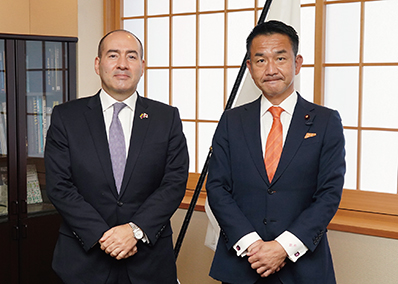
State Minister for Foreign Affairs Odawara receiving a courtesy call from Mr. Santiago Pardo, Ambassador of Colombia to Japan (November 2021)
Japan also provides various kinds of cooperation for Latin American and the Caribbean countries in the fields of health and medical care. In this region, due to the underdeveloped medical system, non-communicable diseases, infectious diseases such as HIV/AIDS and tuberculosis, and tropical diseases are still serious public health concerns. Furthermore, the spread of COVID-19 urges the establishment of a system capable of rapid and accurate diagnosis and treatment (see also “Master Techniques from Japan to the World 1” for the efforts toward achieving UHC in Ecuador).
In 2021, Japan provided grant aid in response to COVID-19, which includes the development of cold chain systems Note 18 in Cuba, Guatemala, Haiti, Jamaica, Nicaragua, Paraguay, and Venezuela. Japan also extended loans to the Dominican Republic and Honduras to support their response to COVID-19, and provided approximately 500,000 doses of vaccines manufactured in Japan to Nicaragua. Furthermore, in addition to such bilateral cooperation, Japan has provided assistance for capacity building and the supply of goods through the Japanese Trust Funds at the Inter-American Development Bank (IDB).
Japan has also continued efforts for Nikkei communities in various countries in Latin America and the Caribbean, such as providing support for the welfare facilities of the Nikkei communities, accepting trainees, and dispatching Japan Overseas Cooperation Volunteers (JOCVs).
Assistance in the sector of education is extremely important for Latin American and the Caribbean countries, where poverty still persists and education budgets are inadequate. Japan implemented technical cooperation for mathematics and arithmetic education in 2021.
■ South-South Cooperation and Cooperation with Regional Organizations
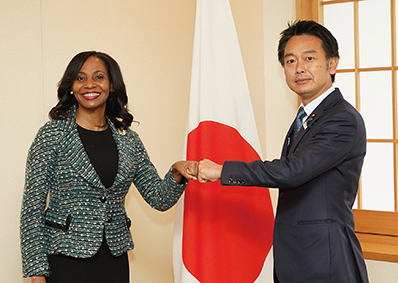
Parliamentary Vice-Minister for Foreign Affairs Uesugi receiving a courtesy call from Ms. Shorna-Kay M. Richards, Ambassador of Jamaica to Japan (December 2021)
Brazil, Mexico, Chile, and Argentina have achieved results in South-South cooperation*, and Japan has signed partnership programs with these countries. Based on such partnerships, Japan collaborated with Argentina in 2021, for example, to provide assistance to small and medium-sized enterprises (SMEs) in Latin America, as well as in Africa. In Chile, Japan conducts human resources development programs through triangular cooperation in the field of disaster risk reduction and has succeeded in training 5,169 people, exceeding the initial target of 4,000 (see “Project Introduction Column”). In Brazil, as a result of many years of cooperation from Japan, the Japanese-style community police system has become widespread. Utilizing this experience and based on the framework of triangular cooperation, Brazilian experts are currently dispatched to Central American countries to pass on knowhow in the field of community policing.
Furthermore, Japan cooperates with regional organizations such as the Central American Integration System (SICA) and the Caribbean Community (CARICOM) to provide more effective and efficient support and formulate regional projects related to common development issues in the Latin American and Caribbean region.
■ Assistance for Central American Migrants and Venezuelan Refugees and Migrants
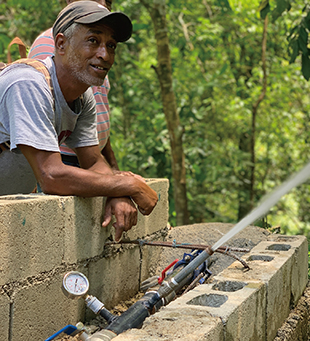
Checking the conditions of flowing water in the water supply system completed with Japan’s support in the Dominican Republic
Central America faces the problem of migrants who aim to immigrate to the United States and Mexico to flee from poverty and insecurity in their country. Japan provides support in the areas of poverty, security, and disasters, which are the root causes of their migration. Moreover, in cooperation with the International Organization for Migration (IOM) and World Food Programme (WFP), Japan provides assistance to Mexico, Guatemala, El Salvador, and Honduras for the promotion of voluntary repatriation of migrants, prevention of outflow of migrants, and social reintegration of returnees.
Moreover, due to the deterioration of the economic and social conditions in Venezuela, approximately 6 million Venezuelan refugees and migrants have flowed mainly to neighboring countries as of December 2021. This has caused the deterioration in the living conditions of the host community residents and the instability of the region, and the lack of adequate response has been a challenge. With regard to Colombia and Peru, which have been receiving displaced Venezuelan people, Japan has provided social integration support such as protection for vulnerable people and vocational training, through the Office of the United Nations High Commissioner for Refugees (UNHCR) and IOM. In addition, due to the deteriorating humanitarian situation in Venezuela, Japan also cooperates through the United Nations Children’s Fund (UNICEF) to support routine immunizations for children and expectant and nursing mothers in the country.
Glossary
- South-South cooperation (Triangular cooperation)
- South-South cooperation refers to cooperation provided by relatively advanced developing countries to other developing countries, utilizing their own development experiences, human resources, skills, funds, and knowledge. In many cases, the cooperation, primarily technical cooperation, is conducted in countries that have similar natural environments, linguistic, cultural, and economic circumstances, and are facing similar development processes. When supported by donors or international organizations, such South-South cooperation between developing countries is referred to as “triangular cooperation.”
Chile
Disaster Risk Reduction Training Program for Latin America and the Caribbean (KIZUNA Project)
Technical Cooperation Project (March 2015 – March 2020)
Chile is located on the Pacific Ring of Fire,*1 just like Japan, and earthquakes, tsunamis, volcanic eruptions and other natural disasters often occur. In 1960, after the Great Chilean Earthquake, the largest earthquake ever on record, tsunamis hit all of the areas around the Pacific Rim, and there was significant damage in Japan as well. Given these circumstances, since the 1960s, Japan has provided cooperation to the Government of Chile in disaster risk reduction (DRR), through the improvement of disaster observation technologies, revision of seismic standards, human resources and organizations development for DRR, and other efforts.
Among them, the KIZUNA project is a triangular cooperation*2 Among them, the KIZUNA project is a triangular cooperation*2 project that intends to spread the techniques and knowledge in the field of DRR that Japan and Chile have cultivated in Latin America and the Caribbean, and to build an international network through sharing the techniques and experience from different countries. Experts were dispatched from Japan and they collaborated with the Government of Chile, universities, local communities, and others to implement training and seminars for researchers and officials in Latin America and the Caribbean. As a result, 5,169 experts and officials were trained across the region, greatly exceeding the initial target of 2,000, and they have become human resources responsible for DRR in their own country, resulting in a significant contribution to networking within the region.
The KIZUNA project is highly valued by the Government of Chile, and it is a model case where Japan’s cooperation not only greatly contributed to the strengthening of Chile’s DRR systems but also developed into cooperation for Latin America and the Caribbean. A successor project was also commenced from 2021, and going forward, it is expected to lead to the further enhancement of DRR measures throughout Latin America and the Caribbean.
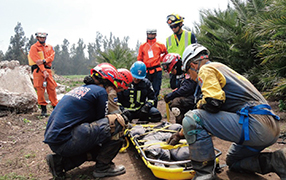
First aid and rescue training implemented with the cooperation of firefighters from Japan (Photo: JICA)
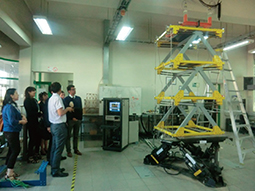
Trainees on a visit to an earthquake-resistant engineering laboratory (Photo: JICA)
*1 A volcanic belt that circles the rim of the Pacific Ocean, and is the collective name of various volcanic archipelagos, including the Japanese archipelago, and volcanic groups.
*2 See the glossary.
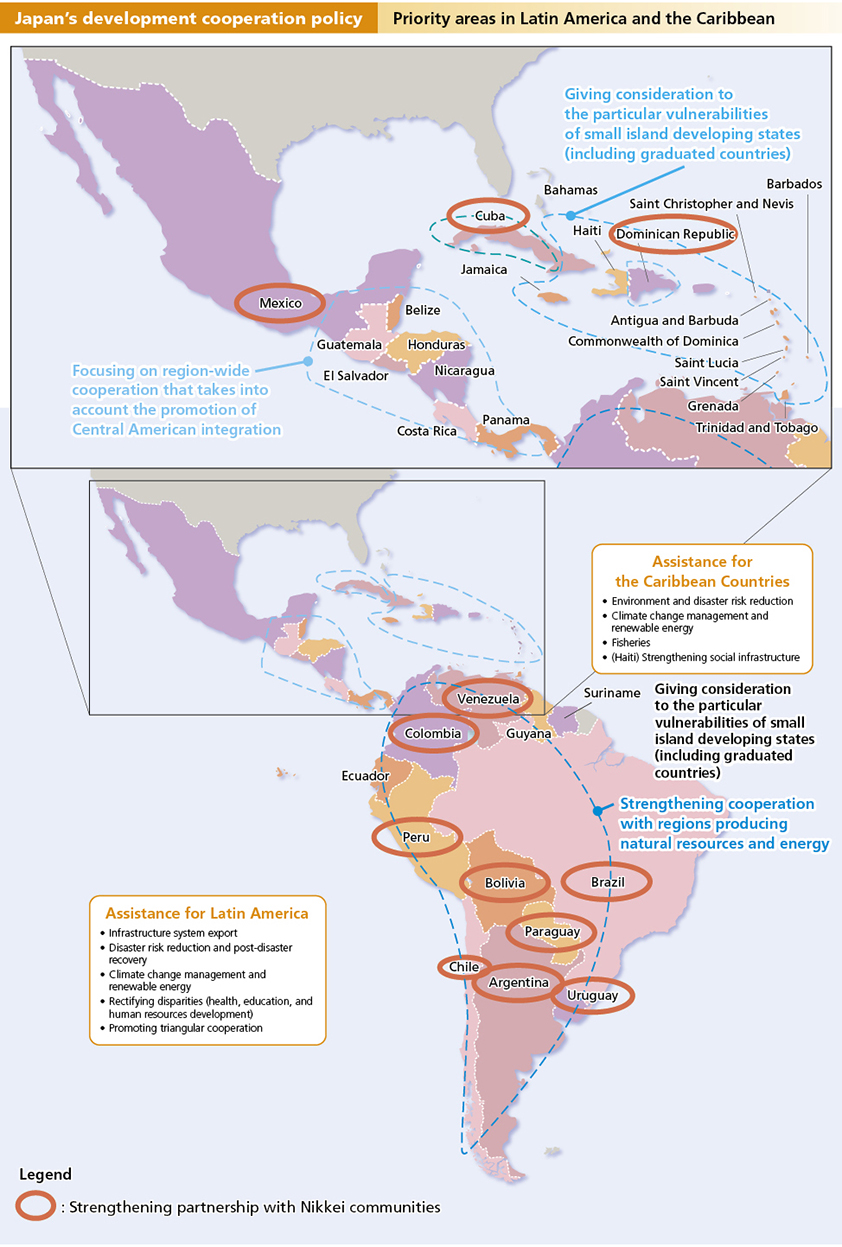
- Note 18: See Note 2.
